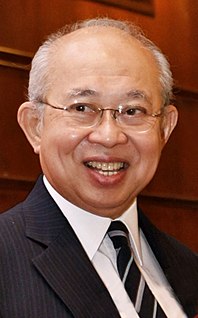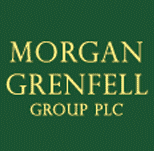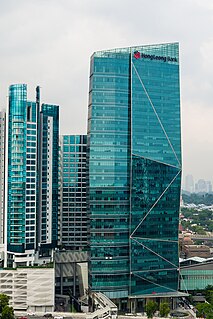
Tan Sri Tengku Razaleigh bin Tengku Mohd Hamzah is a Malaysian politician who has served as Member of Parliament (MP) for Gua Musang since August 1986 and Ulu Kelantan from August 1974 to August 1986. He is now the longest-serving MP by having served since 1974 for 48 years as of 2022. He is sometimes referred to as the Father of Malaysian Economic Development for playing a pivotal role in establishing and implementing key foundations and policies in Malaysian economy. A descendant of Malay royalty, he is a great-uncle of the current Sultan of Kelantan, Sultan Muhammad V.

Morgan, Grenfell & Co. was a leading London-based investment bank regarded as one of the oldest and once most influential British merchant banks.

Boustead Holdings Berhad is a Malaysian corporation. Founded in 1828 as Boustead & Co in Singapore by Edward Boustead, an English businessman, presently it is an affiliate of the Malaysian military.

Hong Leong Bank Berhad is a major public listed banking group in Malaysia.

AmBank Group comprises AMMB Holdings Berhad is one of the largest banking groups in Malaysia whose core businesses are retail banking, wholesale banking, Islamic banking, and life and general insurance.

Olam International is a major food and agri-business company, operating in 60 countries and supplying food and industrial raw materials to over 19,800 customers worldwide. Olam is among the world's largest suppliers of cocoa beans and products, coffee, cotton and rice.
Gustav Christian Schwabe was a German-born merchant and financier who funded companies such as John Bibby & Sons, Harland and Wolff and the White Star Line. Born in Hamburg, Germany, Schwabe moved to Liverpool in 1838 and spent his working life there. Later, Schwabe would spend more time at his house in London, and retired in 1893.
Elementis plc is one of the UK's largest speciality chemicals and personal care businesses, with extensive operations in the United States, Europe and Asia. It is listed on the London Stock Exchange and is a constituent of the FTSE 250 Index.
Scottish Mortgage Investment Trust is a publicly traded investment trust. It invests globally, looking for strong businesses with above-average returns. Scottish Mortgage is managed by Baillie Gifford & Co Limited, the Edinburgh-based investment management partnership. It is listed on the London Stock Exchange and is a constituent of the FTSE 100 Index.
John Buttery was a merchant operating in the Straits Settlements of Penang, Malacca and Singapore. He was, at the time of his death, the senior partner of Sandilands, Buttery & Co., and John Buttery & Co..

Boustead Singapore Limited is an engineering services group listed on the Singapore Exchange. Headquartered in Singapore.

Edward Boustead (1800–1888) was an English businessman and philanthropist, who founded Boustead & Co and played an active role in the development of Singapore as a business and trading centre. Boustead was born in Yorkshire, England. He was the great-grandfather of actor David Niven.

United Overseas Bank Limited, often known as UOB, is a Singaporean multinational banking corporation headquartered in Singapore, with branches mostly found in most Southeast Asian countries. Founded in 1935 as United Chinese Bank (UCB) by Sarawak businessman Wee Kheng Chiang, the bank was set up together with a group of Chinese-born businessmen. The bank is the third largest bank in Southeast Asia by total assets.
Perbadanan Nasional Berhad was set up in November 1969 as a wholly owned government company to carry out the resolutions at the Second Bumiputera Economic Congress. Among the major shareholders included were Malaysia's Ministry of Finance, Bank Negara Malaysia and Bank Bumiputera Malaysia Berhad. Pernas was put under a solid footing under the chairmanship of Tengku Razaleigh Hamzah (1970–1974) who had been the Minister of Finance from 1976 to 1984.

Since its formation in 1963, Malaysia's economic performance has been one of Asia's best. Real gross domestic product (GDP) grew by an average of 6.5% per year from 1957 to 2005. Performance peaked in the early 1980s through the mid-1990s, as the economy experienced sustained rapid growth averaging almost 8% annually. High levels of foreign and domestic private investment played a significant role as the economy diversified and modernised. Once heavily dependent on primary products such as rubber and tin, Malaysia today is an upper middle-income country with a multi-sector economy based on services and manufacturing. Malaysia is one of the world's largest exporters of semiconductor components and devices, electrical goods, solar panels, and information and communication technology (ICT) products.

Behn Meyer Holding AG is a German chemical company and family business that was founded as an overseas trading company in Singapore in 1840 and now develops, manufactures and distributes speciality chemicals. The company headquarters are located in Hamburg and the main focus of its business activities is Southeast Asia. The Group has more than 28 branches, 38 warehouses and several production facilities in more than 14 different countries in Asia, Europe and North America. Its main business activities are divided up into four divisions: AgriCare, Ingredients, Performance Chemicals and Polymers.
The Wallace brothers were the six sons of Edinburgh architect Lewis Wallace. In varying combinations, the brothers established themselves as one of the leading nineteenth century East India merchants, trading in cotton, tea, coffee and other commodities. Through their investments in Burma, they became the world's leading exporter of teak. The rise of independent governments after World War II meant the progressive loss of the family's Eastern assets and the redeployment of capital back to London. This capital was used in the 1960s to establish Wallace Brothers as a banking house but this strategy did not long survive the secondary banking crisis of 1973-75.
Carson Cumberbatch PLC is one of the largest conglomerates in Sri Lanka which also has business interests in Indonesia, Malaysia, and India. The company has its origin in the colonial era, having founded by merging two companies founded by R. B. Carson and Henry Cumberbatch. The Selvanathan family, founders of the Sri Krishna Corporation, is the ultimate controlling shareholder of the company.









